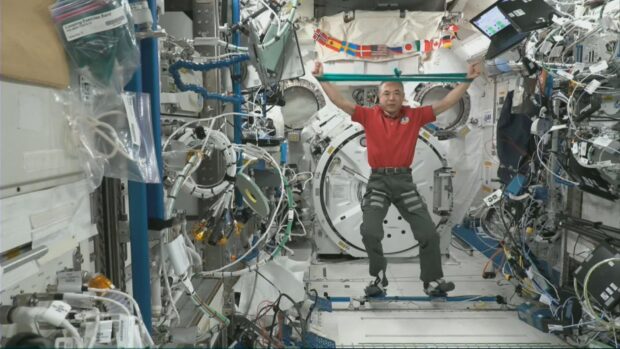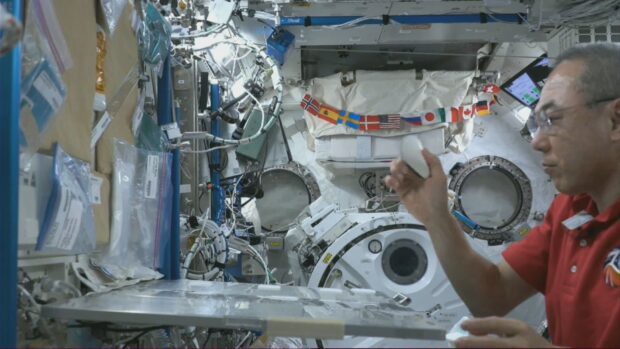2 experiments of PH students conducted on ISS

Japan Aerospace Exploration Agency astronaut Satoshi Furukawa performs 14 Asian Try Zero-G experiments from the Asia-Pacific region on the International Space Station. (Photo and caption courtesy of the National Aeronautics and Space Administration/Japan Aerospace Exploration Agency)
MANILA, Philippines — Two space experiments proposed by Filipino students were conducted aboard the International Space Station (ISS) by a Japanese astronaut last February, the Philippine Space Agency (PhilSA) said on Tuesday.
The experiments – ‘Oloid’s Movement in Microgravity’ and ‘The Effectivity of Elastic Resistance Band Exercise when performed in Zero-Gravity’, were carried out by Japan Aerospace Exploration Agency astronaut Satoshi Furukawa in the Kibo module of the ISS.
PhilSA said that these experiments were part of the 14 proposals submitted by individuals and teams from the Asia-Pacific region during the 2023 Asian Try Zero-G (ATZG).
‘Oloid’s Movement in Microgravity’ was proposed by Paul Anton Mahinay, a student from Rizal Technological University.
“The oloid, a geometrically shaped object, is characterized by a lemniscate or a rhythmically pulsating figure-eight movement. Its center of gravity stays at a constant distance to produce smooth movements. However, due to the conditions of microgravity or zero gravity, the movement of the oloid is proposed to be affected,” PhilSA said in a statement.

Astronaut Furukawa repeatedly throws the oloid in microgravity to test its movement. (Photo and caption courtesy of the National Aeronautics and Space Administration/Japan Aerospace Exploration Agency)
To assess the movement of the oloid in zero gravity, Furukawa “repeatedly conducted tests involving both throwing the oloid both with rotation and without rotation, observing its movements closely.”
Meanwhile, ‘The Effectivity of Elastic Resistance Band Exercise when performed in Zero-Gravity’ experiment was an idea of senior high school students Gabriel John Guila, Dianne Cristine Cabiedes, Sean Matthew Castaneda, Franz Joshua Corpuz, Jose Ernest Guila, Arniel Kurt Macalla, Lee Andrew Medina, Giorgione Parrera, and Ace Gabriel Pega from Bataan National High School.
“The exercise involving elastic resistance bands aims to target the back muscles, calf muscles, and quadriceps of astronauts who are prone to atrophy due to microgravity conditions in space,” said PhilSA.
It added that Mahinay and the team from Bataan National High School will present their analysis and results during the ATZG wrap-up session later this year.
The ATZG is one of the activities of the Kibo-Asian Beneficial Collaboration (ABC) program.
Established by the Space Frontier Working Group of the Asia-Pacific Regional Space Agency Forum, the program aims to promote the “utilization and share the value of the Japanese Experiment Module “Kibo,” enhance the capacity of participating organizations, and foster collaborative projects between Japan and Kibo-ABC member countries.”